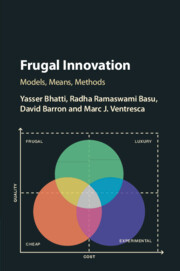Description
Frugal Innovation
Models, Means, Methods
Authors: Bhatti Yasser, Ramaswami Basu Radha, Barron David, Ventresca Marc J.
Outlines a new theory of frugal innovation and provides a set of practical tools to support implementation.
Language: English
Subject for Frugal Innovation:
Approximative price 32.87 €
In Print (Delivery period: 14 days).
Add to cart
Frugal Innovation
Publication date: 03-2022
Support: Print on demand
Publication date: 03-2022
Support: Print on demand
Approximative price 120.25 €
In Print (Delivery period: 14 days).
Add to cart
Frugal Innovation
Publication date: 11-2018
336 p. · 15.6x23.5 cm · Hardback
Publication date: 11-2018
336 p. · 15.6x23.5 cm · Hardback
Description
/li>Contents
/li>Biography
/li>
In light of growing discourse on 'frugal innovation', this book offers novel approaches to innovation based on extensive empirical research. The study complements a decade of scholarly attention on frugal innovation by taking a research-based approach to innovation in resource-scarce and complex institutional contexts. The findings suggest that concepts such as frugal, reverse, jugaad, social, grassroots and inclusive innovation in fact represent heterogeneous assemblies of innovation for social, environmental and economic value. The conceptual framework invites attention to more plural sources and elements in the study of models of innovation to inspire further research in the fields of strategy, innovation, entrepreneurship, economic sociology and development studies. The design framework offers models, metrics and competencies for practitioners and policymakers to identify, evaluate and design frugal innovations. The comprehensive view of frugal innovation demonstrates how firms can implement globally competitive strategies by pursuing innovation for humanity to improve lives for everyone, everywhere.
Part I. Models of Frugal Innovation: 1. Outline of the context, literature and methodology; 2. Conceptualising innovation – Model 1; 3. Conceptualising innovation under constraints – Model 2; Part II. Towards a Theory of Frugal Innovation: 4. Integrative results and theory development; 5. Test of models using secondary cases; 6. Emerging concepts in innovation; 7. Implications for research, practice and policy; Part III. Tools for Practice and Research: Appendix A. Toolkit to identify frugal innovations; Appendix B. Core competencies from the frugal innovation lab; Appendix C. Detailed research methodology and design; References; Select Bibliography.
Yasser Bhatti is a Research Fellow at the Institute of Global Health Innovation, Imperial College London. His social innovation research focuses on the role of emerging market economies and situated actors, such as social entrepreneurs, in emerging trends in innovation that include frugal and reverse innovation. Most recently, he served as an expert on the scientific advisory board of the European Commission project on Frugal Innovation.
Radha Ramaswami Basu has over forty years of experience in technology innovation and management. She is widely recognized as a leading woman entrepreneur in hi-tech companies and as a pioneer in the Indian software business. Radha is founder and CEO of iMerit Inc., a technology services company (www.iMerit.net) that pioneers the 'smart sourcing model', working on latest AI, machine learning and ecommerce services for global clients. Radha was Founder and Director of Frugal Innovation Lab at Santa Clara University, California, and sits on the boards of NetHope, Santa Clara University Miller Center for Social Entrepreneurship and Jhumki Basu Foundation. She has won numerous awards including the first UN Women GEMTECH award, Excelsior Leadership, Top25 Women of the Web, CEO of the Year 2000, and Leader of the Millennium.
David Barron is a Rhodes Trust Associate Professor in Organisational Sociology at the Saïd Business School, University of Oxford, as well as the Vice Principal and a Fellow and Tutor in Management Studies at Jesus College, Oxford. After graduating from the University of Cambridge in 1979 with a degree in natural sciences, he worked for several years as a social worker in Scotland and London, before completing his M.A. and Ph.D. in sociology at Cornell University. David Barron's research is concerned with the sociology of organisations, quantitative research methods and social networks.
Marc J. Ventresca is an economic sociologist in the Strategy, Innovation and Marketing Faculty at the Saïd Business School, U
Radha Ramaswami Basu has over forty years of experience in technology innovation and management. She is widely recognized as a leading woman entrepreneur in hi-tech companies and as a pioneer in the Indian software business. Radha is founder and CEO of iMerit Inc., a technology services company (www.iMerit.net) that pioneers the 'smart sourcing model', working on latest AI, machine learning and ecommerce services for global clients. Radha was Founder and Director of Frugal Innovation Lab at Santa Clara University, California, and sits on the boards of NetHope, Santa Clara University Miller Center for Social Entrepreneurship and Jhumki Basu Foundation. She has won numerous awards including the first UN Women GEMTECH award, Excelsior Leadership, Top25 Women of the Web, CEO of the Year 2000, and Leader of the Millennium.
David Barron is a Rhodes Trust Associate Professor in Organisational Sociology at the Saïd Business School, University of Oxford, as well as the Vice Principal and a Fellow and Tutor in Management Studies at Jesus College, Oxford. After graduating from the University of Cambridge in 1979 with a degree in natural sciences, he worked for several years as a social worker in Scotland and London, before completing his M.A. and Ph.D. in sociology at Cornell University. David Barron's research is concerned with the sociology of organisations, quantitative research methods and social networks.
Marc J. Ventresca is an economic sociologist in the Strategy, Innovation and Marketing Faculty at the Saïd Business School, U
© 2024 LAVOISIER S.A.S.




